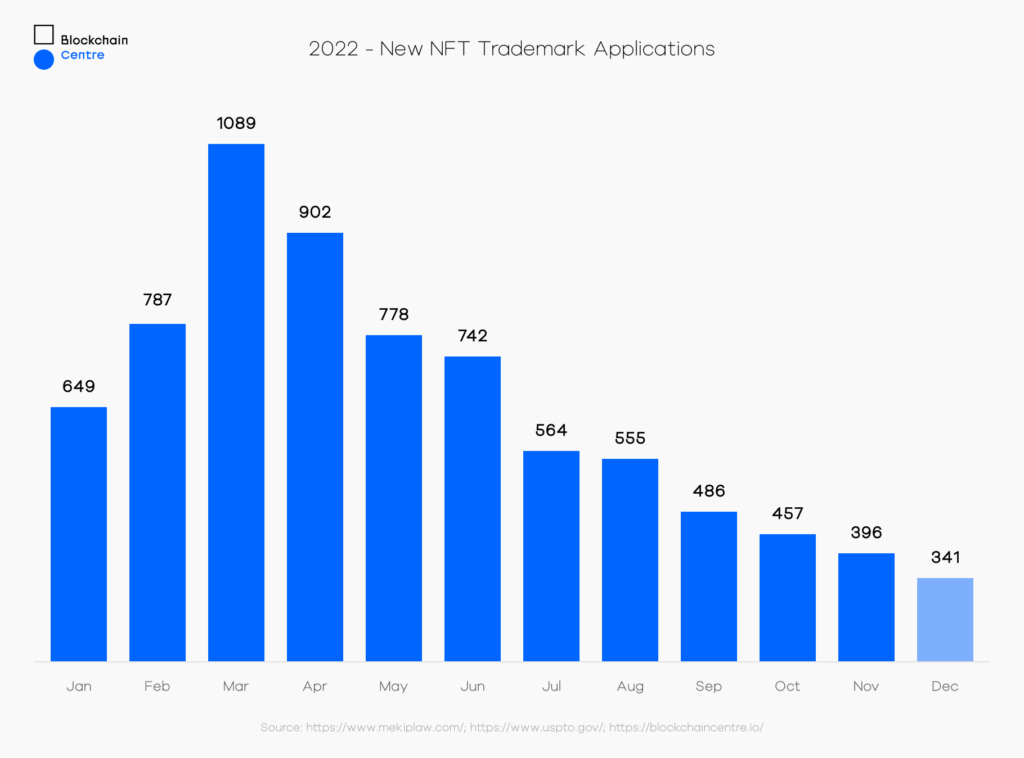In 2022, amidst global economic uncertainty, the number of Metaverse-related trademark applications surged by 200%, signalling the growing importance and potential profitability of this emerging industry.
According to recent data collected by Blockchain Centre in collaboration with the United States Patent and Trademark Office (USPTO) and USPTO Licensed Attorney Michael Kondoudis, there has been a significant surge in Metaverse and NFT trademark applications in 2022. Last year, a total of 5,850 new Metaverse trademark applications were registered.
This represents an astonishing growth rate of 205.64% from the previous year, when the total number of metaverse trademark applications registered was 1,914. Notably, the number of registered trademarks in 2021 increased by 93.3% compared to the previous year.
The monthly trends for metaverse trademark registrations also reflect the significant growth in the popularity of the metaverse concept. The number of trademark registrations steadily increased throughout the year, with at least 300 new applications filed every month. For instance, in January, there were 419 new Metaverse trademark registrations, while February saw 577 new registrations.
The highest number of monthly applications in 2022 occurred in March, with a total of 786 new trademarks registered. In contrast, the lowest number of monthly registrations was recorded at the end of the year, with 349 registrations in October, 373 in November, and 323 in December.



The growth in trademark registrations related to the metaverse is not limited to the metaverse alone. In fact, there has also been a significant increase in the number of trademark applications related to non-fungible tokens (NFTs).
In 2022, a total of 7,746 NFT trademark registrations were filed, representing a growth rate of 259.61% from the previous year, when the total number of NFT trademark applications was 2154. Interestingly, 2021 saw a growth rate of 7,877.77% from the previous year, highlighting the rapid growth of NFTs in recent years.
Similarly to metaverse trademark registrations, the monthly trends for NFT trademark registrations were also quite consistent. There were at least 300 monthly registrations, with the highest number of applications occurring in March, when 1,089 new NFT trademark applications were registered. In contrast, the lowest number of monthly registrations was recorded in December, with only 341 new applications filed.
Among the trademark registrations filed last year was the luxury brand Hermès which applied for a trademark on August 26th to use its name in the Metaverse, NFTs, and virtual currency. This came after the company filed a lawsuit against MetaBirkins and its founder Mason Rothschild for supposedly making money from selling NFTs with the Birkin brand name.
Additionally, many big companies, including Meta, Formula One, Mastercard, McDonald’s, Gatorade, and the U.S. Space Force, have also filed applications with the USPTO in 2022, indicating their interest in virtual products and involvement with crypto and blockchain.
The US Patent and Trademark Office and US Copyright Office will investigate how NFTs impact intellectual property rights due to growing interest in this area. Senators Patrick Leahy and Thom Tillis requested this examination in June to analyze the potential consequences of this burgeoning asset class on intellectual property rights.
Recently, several prominent brands have faced challenges when their intellectual property or products were infringed upon by NFT marketplaces or platforms. Nike, for example, took legal action against StockX in February for selling unlicensed sneaker NFTs that infringed on its trademark. Similarly, in November 2021, production company Miramax sued Quentin Tarantino for infringing on copyrights when he tried to launch an NFT collection based on his film Pulp Fiction.
Despite the ongoing ‘crypto winter’, the rise in trademark applications and growing interest in metaverse products have served as a counterbalance to concerns that the market is being negatively impacted.







